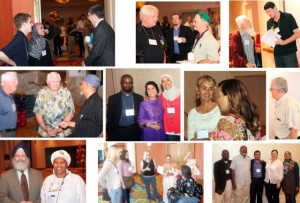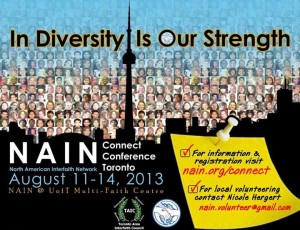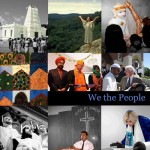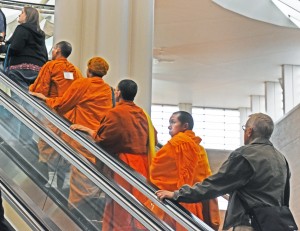Are you still here? Did those few black letters, put together to form a word with which society associates so much meaning, make you shiver at the mere sight and want to close the page?
I know how you feel.
 However, dear reader, I’m here to tell you that not only did my old attachment to this word–evangelism–get smacked down, it got redefined. Revised. Edited, and re-written within the concepts of my brain-waves. I learned the other day that I too, am an Evangelist. For the first time ever, a perspective through the eyes of an interfaith colleague was put to me when the NAIN (North American Interfaith Network) Board Chair referenced those of us on the board — not to mention those of us doing interfaith work — as Evangelists.
However, dear reader, I’m here to tell you that not only did my old attachment to this word–evangelism–get smacked down, it got redefined. Revised. Edited, and re-written within the concepts of my brain-waves. I learned the other day that I too, am an Evangelist. For the first time ever, a perspective through the eyes of an interfaith colleague was put to me when the NAIN (North American Interfaith Network) Board Chair referenced those of us on the board — not to mention those of us doing interfaith work — as Evangelists.
We are “Interfaith Evangelists,” and this year we were in Toronto, Canada, partaking of our yearly NAINConnect conference. This year’s theme happened to be “In Diversity is Our Strength.” One of the common discussions we have when we come together as interfaith dialoguers is our experience had during the past year of reaching out to our individual communities, relating to interfaith work. Part of our shared experiences pertains to the fact that when people who don’t do interfaith work have a conversation with us, we first have to get over the hurdle that we are NOT trying to convert them into a new religion.
 We are in fact, making an attempt to let them know how much we appreciate that their religion is different from ours. This is, at least to us, what interfaith is all about. It’s about recognizing and respecting another’s faith tradition, rather than telling them they’re doing (their faith) wrong.
We are in fact, making an attempt to let them know how much we appreciate that their religion is different from ours. This is, at least to us, what interfaith is all about. It’s about recognizing and respecting another’s faith tradition, rather than telling them they’re doing (their faith) wrong.
Also during the conference, at one of the breakout sessions, another participant of NAINConnect raised the issue of Evangelism and interfaith dialogue. He voiced that on one hand, those Evangelical types (the old-style, I reckon) and Catholics are coming together through dialogue of common issues. Issues like LGBTQ, racism, homelessness, etc. Yet his concern was for the other hand – the fact that these same issues are actually closing doors between the mentioned religions and others. He shared the feeling that these topics were causing dis-unity, rather than commonality.
I am here to remind that while it may seem that “doors are closing,” there is the old adage that “when one door shuts, another door opens.” And perhaps that is what is needed in this situation. Perhaps it is time to close those old doors. Let the heavy weight of the old ways shut firmly behind us, so we may turn instead towards the future. A future where interfaith dialogue is not a movement, but rather a way of life. As one colleague stated, her idea of how an interfaith future would look like is a day where she goes to the coffee room during break, and chat with her co-worker who is a Muslim or a Hindu.
 To keep the dialogue open – to find that “new” door, it is a simple matter of acknowledging compassionately that we, as society, sometimes do not agree. The thing is, is that we don’t HAVE to agree. When you start to feel your buttons are being pushed, stop for a moment, and BREATHE. Then perform a new concept of active listening – and repeat back – gently – to your counterpart, what it is you think you heard, so as to gain clarification. Sometimes it’s more a matter that we haven’t heard correctly what they were trying to get across to us.
To keep the dialogue open – to find that “new” door, it is a simple matter of acknowledging compassionately that we, as society, sometimes do not agree. The thing is, is that we don’t HAVE to agree. When you start to feel your buttons are being pushed, stop for a moment, and BREATHE. Then perform a new concept of active listening – and repeat back – gently – to your counterpart, what it is you think you heard, so as to gain clarification. Sometimes it’s more a matter that we haven’t heard correctly what they were trying to get across to us.
Like thinking back on all these years that I’ve heard the word, “Evangelism,” and tying the sound to a description of a person that can or will not appreciate who or what I’m about. Sometimes it’s just a simple matter of doing that active listening to someone speaking a different perspective to that same old sound that can make you look at things a bit differently. To see that it’s time to step away from that old door, turn-around, and see the new door in front of you.
















